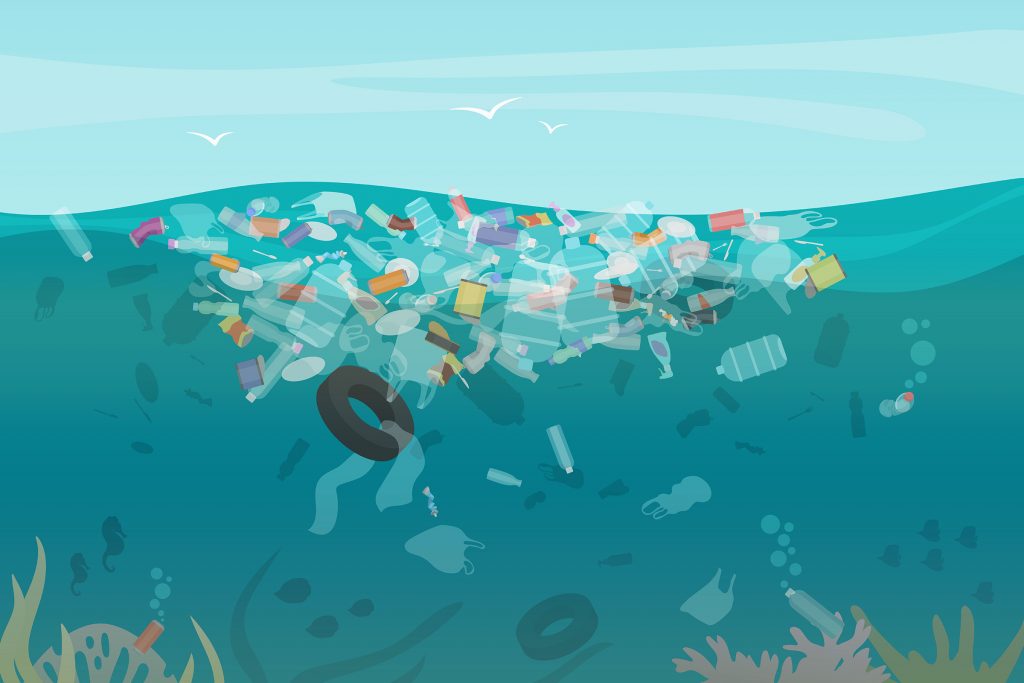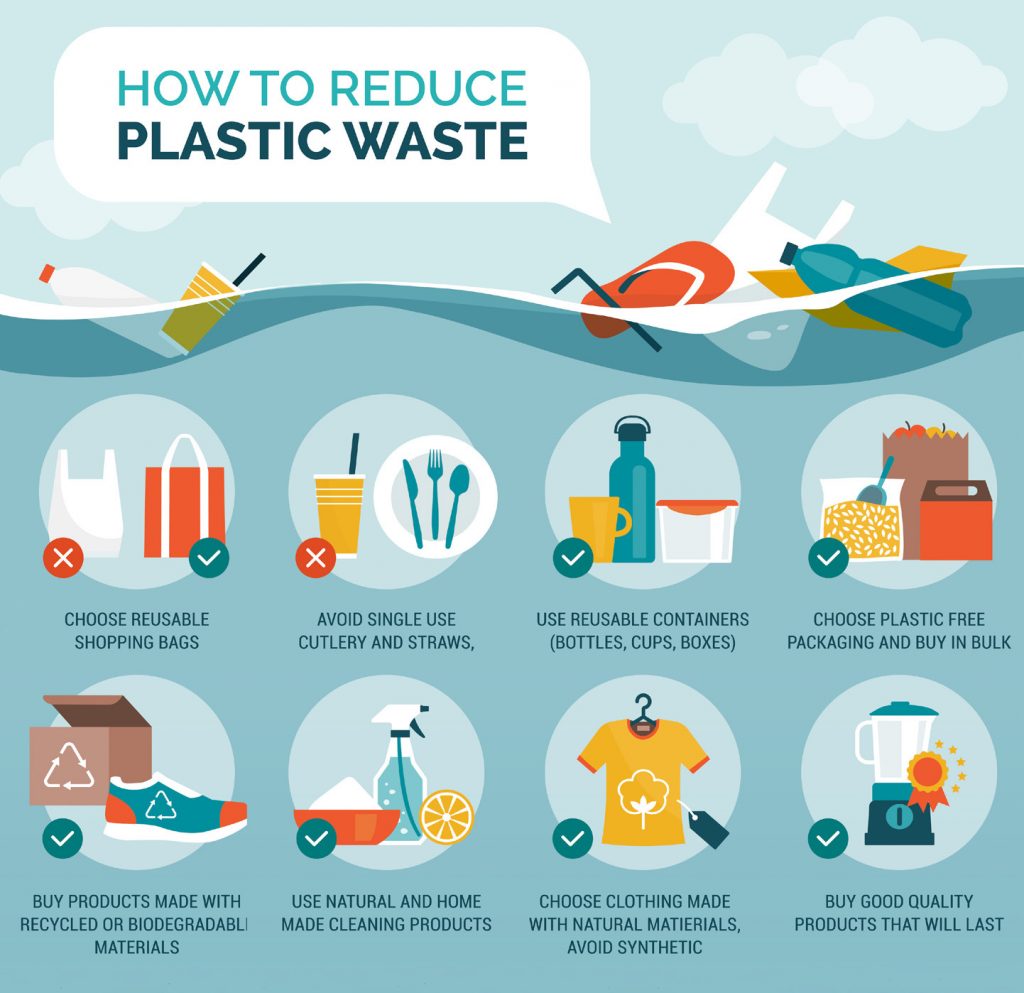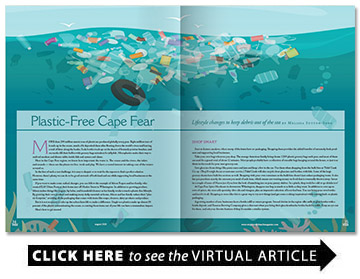Plastic-Free Cape Fear
Lifestyle changes to keep debris out of the sea
BY Melissa Sutton-Seng

More than 300 million metric tons of plastic are produced globally every year. Eight million tons of it ends up in the ocean, much of it deposited there after floating down the world’s rivers and leaving a trail of litter along the banks. Soda bottles wash up on the shores of formerly pristine beaches, and sea turtles fill their bellies with grocery bags mistaken for jellyfish. Microplastics make their way to seafood markets and dinner tables inside fish and oysters and clams.
Here in the Cape Fear region, we know how important the water is. The ocean and the rivers, the inlets and sounds — these are the places we live, work and play. We have a vested interest in taking care of the waters around us.
In the face of such a vast challenge, it is easy to despair or to wait for the experts to find a perfect solution. However, there’s plenty we can do to be good stewards of both land and sea while supporting local businesses at the same time.
If you want to make some radical changes, you can follow the example of Alison Rogers and her family, who created ILM Urban Farm at their home just off Market Street in Wilmington. In addition to growing produce, Alison makes things like yogurt, lip balm, and household cleaners as her family works toward a plastic-free lifestyle. By growing their own produce and making many daily essentials at home, Alison and her family reduce their “plastic footprint,” avoiding all the packaging that comes with items like soaps, cleaners, dairy products and produce.
But it is not necessary to take up the urban farm life to make a difference. Single-use plastics make up almost 90 percent of the plastic contaminating the ocean, so cutting those items out of your life can have a tremendous impact.
Here’s how to get started.
Shop Smart
Start at farmers markets, where many of the items have no packaging. Shopping there provides the added benefits of extremely fresh products and supporting local businesses.
Take your own bags wherever you shop. The average American family brings home 1,500 plastic grocery bags each year, and most of them are used for a grand total of about 12 minutes. Most people probably have a collection of reusable bags hanging around the house, so just toss them in the trunk for your next grocery run.
Save glass jars from things like pasta sauce and jam and keep a few in the car. Use them when shopping from the bulk bins at Tidal Creek Co-op. (They’ll weigh the jar at customer service.) Tidal Creek will also recycle clean glass jars and bottles, with lids. Some of the large grocery chains have bulk bin sections as well. Shopping with your own containers at the bulk bins doesn’t just reduce packaging waste. It also lets you purchase exactly the amount you need of each item, which means not wasting money on food that is eventually thrown away. Invest in a couple of cases of Mason jars if you love the look of matching jars on your pantry shelves. In a pinch, they work for cold to-go drinks too!
At Cape Fear Spice Merchants in downtown Wilmington, shoppers can buy as much or as little as they want. In addition to rows upon rows of spices, the store sells specialty olive oils and vinegars, plus an impressive selection of loose-leaf teas. You can bring your own bottles and jars for it all. Shopping at stores like this is a great way to try new things (and get some cooking inspiration) while cutting back on plastic packaging.
A growing number of area businesses have a bottle refill or return program. Several dairies in the region offer milk in glass bottles with a bottle deposit, and Panacea Brewing Company gives a discount when you bring their glass kombucha bottles back for refills. Keep an eye out for these, and ask your favorite business if they’d consider a similar system.
BYOC: Bring Your Own Cup
The disposable cup is a relatively recent invention, but for some it’s hard to imagine life without a morning latte to go or an afternoon smoothie on the way to the beach. The trouble is that all those paper cups are lined with plastic and are not recyclable. Same goes for the polystyrene foam ones. In the United States, our to-go cup habit adds up to 500 billion — yes, billion with a B — cups a year. Get in the habit of bringing your own cup for hot and cold drinks. They hold temperature longer, and you often get a discount in return for your good deed. Just like reusable totes, most of us have a stash of promotional tumblers hiding somewhere in our kitchens. Free up some cabinet space and add a couple of reusable cups to that growing zero-waste kit in your car.
Of course, you often need a straw to go with those liquid treats, and plastic straws are among the most common types of ocean plastic. The Hardens, a Southport family, decided to find an alternative. After trying everything from bamboo straws (which felt weird) to pasta straws (which disintegrated), they discovered glass straws. The Hardens saw an opportunity to save marine life by helping others make the switch to glass straws, and the Sea Glass Company was born. They make each straw by hand in their Southport shop and recently added glass water bottles to the lineup. The shop donates 10 percent of all sales to Ocean Conservancy as well as participating in a local marine stranding program.
Reusable water bottles are somewhat of a fashion item, coming with stripes, flowers, leopard print, and every school color under the sun. As ubiquitous as these stainless-steel containers are, Americans still buy over 50 million single-use water bottles a year. Using your own water bottle saves a lot of plastic.
To join in the work of area nonprofits, check out Cape Fear River Watch and the Plastic Ocean Project. The plastic problem is real, but we Cape Fear locals can rise to the challenge.

Think Small: It’s the Little Things
Many of the tiny plastics that end up in the ocean come from our bathroom and kitchen cabinets. It takes a bit of effort, but it is possible to find locally made products with eco-friendly packaging to replace some of those everyday plastics.
Home Body Field Goods makes small batch items like soap, tooth powder (in jars instead of that unrecyclable tube!), dry shampoo, and more. All items are handmade in Wilmington with natural ingredients and are packaged to create little or no plastic waste.
Finding makeup without plastic packaging can be a challenge. River Organics, a Wilmington beauty company focused on simple, healthy ingredients, sells it in plastic-free containers. The company operates as close to zero-waste as possible, right down to the sugar cane-based compostable labels on their packages.
Another Wilmington company tackling the plastic waste problem is Thrivin’ Hive Food Wraps. Reusable beeswax wraps can be a great substitute for the cling wrap and zip-top baggies found in most kitchens. In addition to reducing plastic waste, beeswax wraps can discourage microbial growth and slow food spoilage, and they can be composted when they wear out. These wraps are created by a mother-daughter team from organic and sustainably sourced materials.
In addition to these businesses, there are dozens more focusing on responsible local food sourcing, second-hand furniture and clothing, and upcycled home décor, all of which contribute to the fight against ocean plastics. Supporting these businesses and making small changes to daily habits can have a significant impact.
